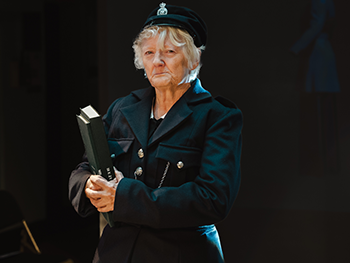University News Last updated 04 December 2024

A Victorian jail in the heart of Birmingham played host to a fashion show with a twist as Birmingham City University (BCU) and West Midlands Police (WMP) celebrated the launch of a unique research project.
Current and former police officers became models for the day, dominating the catwalk at the old lock-up in Steelhouse Lane as they displayed 11 historic police uniforms that had been recreated by fashion, computing, and visual effects students at BCU.
The show also featured avatars developed by BCU fashion and computing staff. They ranged from the original Peeler outfit of 1839 to the 20th century riot suit and shared real stories that brought the project to life.
“We’re breaking new ground,” said Professor Carlo Harvey, BCU’s project lead.
“By analysing and reinterpreting these historic uniforms, we’re exploring how they shape public perceptions of authority, identity, and community history, and how these evolve over time.
“Using 3D scanning, digital patternmaking, and garment reconstruction, we’ve created a shared experience that contributes to Birmingham’s rich cultural landscape.
“We're not only preserving stories but reimagining them for today's audiences.”
Adam Francis, Senior Lecturer in Fashion Communication at BCU, agreed.
“We’re reconsidering how fashion evolves outside the traditional catwalk,” he said. “By fusing this with digital technology, we’ve been able to bring history to new audiences in a fun and immersive way.”
Made possible by a grant of £243,263 from The National Lottery Heritage Fund, the aptly named Fashion Police project is also boosting student employability.
“Our students are gaining hands-on experience of digital heritage practices and developing strong portfolios that will appeal to employers in the creative industries,” said Professor Harvey.
Toby Richardson, a Fashion Design graduate, spent months recreating the uniforms.
“Being part of this project has given me the practical sewing, pattern drafting, and digital skills that I need to start my career in the fashion industry,” he said.
“In fashion, you normally do things in the quickest way. But having the uniforms as set pieces, I’ve studied seams, pockets, fixtures, and garment types I’ve never worked with before.
“The riot suit is my favourite. I was able to use lots of new techniques.”
The project embodies the themes of BCU’s new 2030 strategy – creating knowledge that engages and informs communities in Birmingham whilst equipping graduates with the skills, confidence, and connections to hit the ground running in a competitive job market.
BCU fashion lecturer Lucinda Holbrook-Hase commented: "The fashion industry is incorporating more digital technologies and it’s exciting to blend these advancements with traditional processes.
"Students utilised the skills they acquired during their degree to create 3D versions of the uniforms for a more detailed review before recreating them. The inclusion of 3D ‘avatars’ gave them a deeper connection with the garments and people who wore them than they’d get from mannequins.”
Hayley Gorton-Snowball, an expert in fashion pattern cutting at BCU, added: “The students collaborated well and met deadlines whilst maintaining excellent quality and attention to detail – all essential professional skills for the future.
"The addition of digital skills has boosted their employability and given them a springboard from which to launch their careers.”
PS Surjit Singh Sihota, who joined the force in 1978 and retired in 2008, was in the audience.
The first turban-wearing police officer in the West Midlands, he watched a recreation of the uniform he had worn for more than 30 years take its rightful place on the runway as an important moment in the force’s history.
“When members of the Sikh community saw me in the force, I think they realised that their turban and their religion wasn’t a hinderance,” he said.
“To become a part of something, you need to relate to it. I think I was able to show them that the police could be a career for them, too.”
A total of 24 uniforms have been recreated by BCU students as part of the Fashion Police project.
Members of the public can explore these and the stories behind them at an exhibition that opens at the West Midlands Police Museum next year.
The uniforms will also be on display at BCU’s Innovation Fest and Inspired Festival next summer, while local schoolchildren will be able to get up close to the garments through a series of outreach events.
Discover more about Fashion Police, explore the historic uniforms, and view the photo gallery.